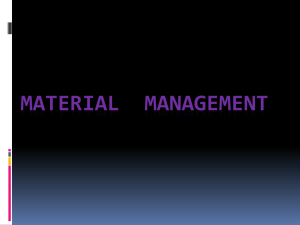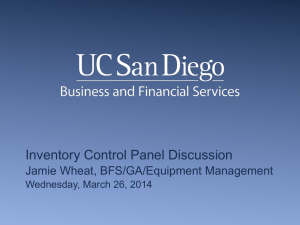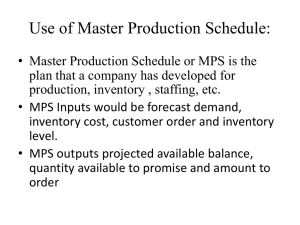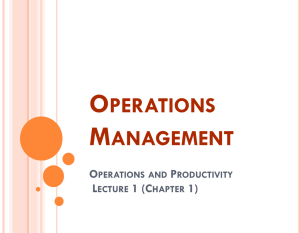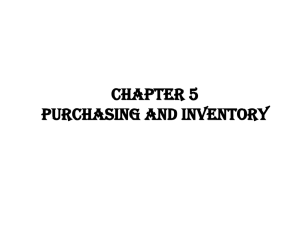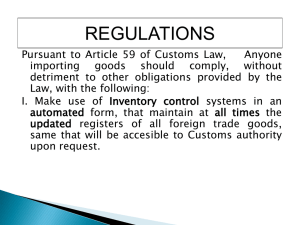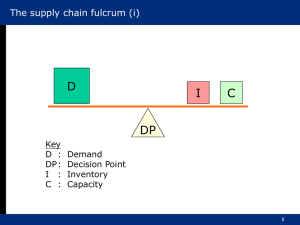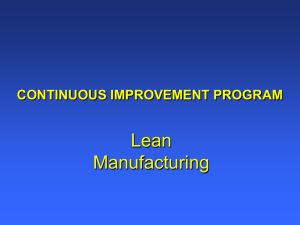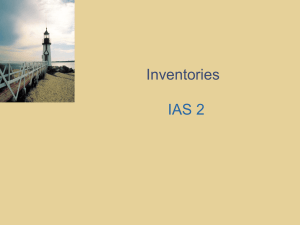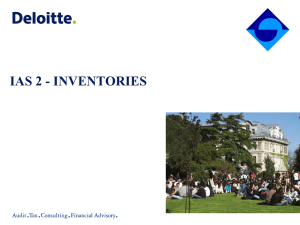Proposed Paradigm Change to Physical Inventories
advertisement
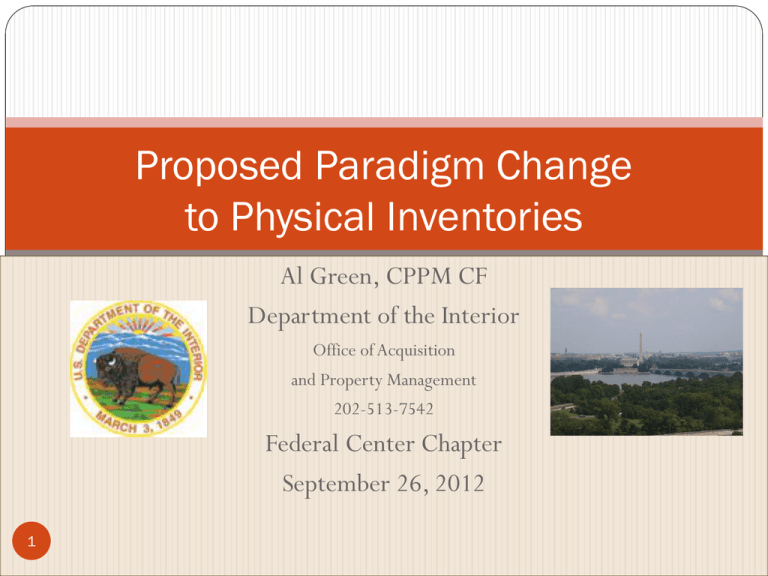
Proposed Paradigm Change to Physical Inventories Al Green, CPPM CF Department of the Interior Office of Acquisition and Property Management 202-513-7542 Federal Center Chapter September 26, 2012 1 A Proposed Paradigm Change for Inventories Three Proposed Policy Changes and Pilot Test What We Learned and Recomendation 2 A Proposed Paradigm Change for Inventories Personal property over 3 one million items of personal property valued at over $1.7 billion Museum property consisting of more than 160 million artworks, artifacts, documents, and other museum properties and priceless !!! Property Inventory Control Program 4 Propose: To modify the current methodology for conducting personal property physical inventories, processes and frequency of inventories. Use: Industry’s best practices and ASTM International Standards. Purpose: To strengthen the PICP for over a 161 million personal and museum property assets. Goal: Use systematic control techniques to accurately maintain asset accountability as required by law for government personal property in the possession of DOI. Expected Efficiencies 50 percent physical inventory reduction Effective management of employees time to focus on specific property types rather than the entire inventory Physical control over high risk assets including electronic stewardship (reuse, remanufacturer, recycle) Streamlining and maintaining accurate and timely recording of transaction historical events 5 Current Inventory Methods Statistical Random Sampling (SRS) Museum Wall-to-Wall (WTW) Personal Property HIGH RISK LOW RISK 6 Physical Touching Every Asset 7 Change of designated authority; The method for physical inventories, and The frequency of physical inventories. 7 American Society for Testing and Materials - ASTM International Standards Adapting ASTM standards is crucial to the Property Inventory Control 8 Program. It is through these standards that will help to identify the expected efficiencies. ASTM E2132-01, Standard Practice for Physical Inventory of Durable, Moveable Property; ASTM E2131-09 Standard Practice for Addressing and Reporting Loss, Damage, or Destruction of Tangible Property; ASTM E2279-09 Standard Practice for Establishing the Guiding Principles of Property Management ASTM E2605-08 Standard Practice for Receiving Property. Note: For your information you can purchase a copy of any of these ASTM Standards at the following web site: http://www2.astm.org/ABOUT/overview.htm Propose Inventory Methods Statistical Random Sampling (SRS) Inventory by Exception (IBE) Transaction Based Inventory (TBI) Change of Designated Authority (CDA) LOW RISK HIGH RISK 9 Location Survey Validation Techniques Location Records Review DOI Personal Property - BLM - Denver National Operations Center -- Wall-To-Wall (100%) -- Inventory by Exception Random Sample -- 793 (100% Accurate) 285/1000 = (29%) - USGS - Texas Water Science Center -- Wall-To-Wall (100%) -- Fleet by Exception -- Total Fleet Assets 87 Random Sample -- Random Sample 17 (100% Accurate) 74/87 = (85%) DOI Museum Property -- Random Sample methods used for last 20 years 10 Department of Energy (Title 41, Part 109 - PPM STD and Practices) - Resulted in 87% reduction in their inventory effort. - Changed the majority of their frequency of inventories to every three years. - Use statistical sample inventories led to a $6.6 million savings. - Maintain inventory accuracy rate of 97% or better. Boeing, General Dynamics and ITT - Uses industry leading practices to reduce and eliminate traditional, costly 100% inventories. Leading organizations (Aerospace Industries Association) and (DOI-OSMRE) - Have completely eliminated 100% inventories by using inventory by exception or inventory by transaction techniques. 11 Established the basis that anytime an asset is handled during the inventory cycle, it may be counted as inventoried using Inventory by Exception. Confirmed that the frequency of inventories should be a predicated on several considerations: the type of property; movement of property; the volume involved; and an estimate of usage. Achieved a higher inventory accuracy rate than expected when we applied the new inventory methods. Level of internal control was better than 12 expected and maximizes inventory performance with minimum interference on operating activities. Validated that ASTM Standards and leading business practices do help to streamline inventory processes. Testers were able to save time and effort using the new inventory methods to replace 100% physical inventories; training will be necessary to implement. Creates the flexibility to choose among 13 the inventory methods that best fits specific personal property types. Recommendation 1. Approve PICP Methodology 2. Implement PICP Methodology Including Next Steps Paradigm Change to Physical Inventories PICP Timeline – 16 Months PICP SEP 11 PRE-MGT NOV11 Pilot Test APR-JUL 12 POST-MGT SEP 12 POLICY & TRN NOV12 IMPLEMENT JAN13 15 16 Technological Innovations Radio Frequency Identification (RFID) Global Positioning Systems (GPS) Bar-Code Readers Tablets and Smart Phones APPs Digital Video Smart Card Technology 17

